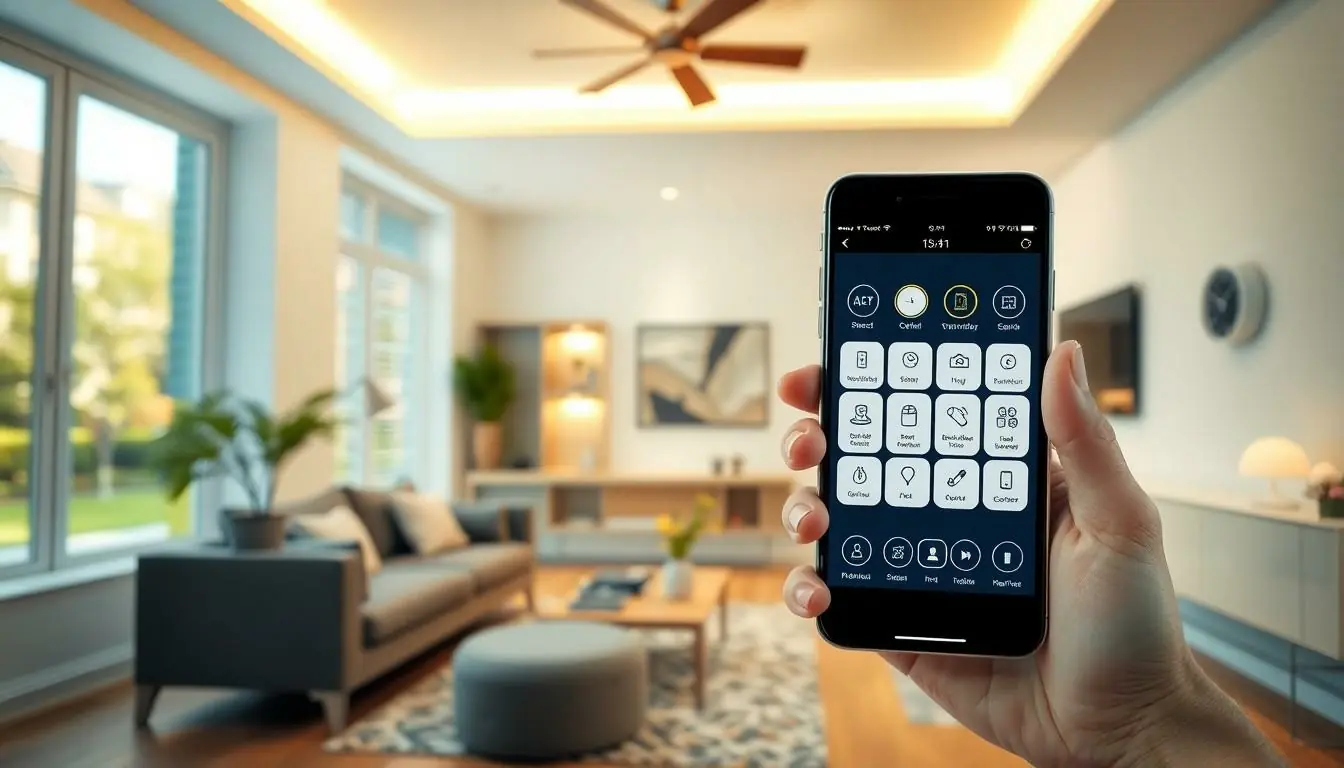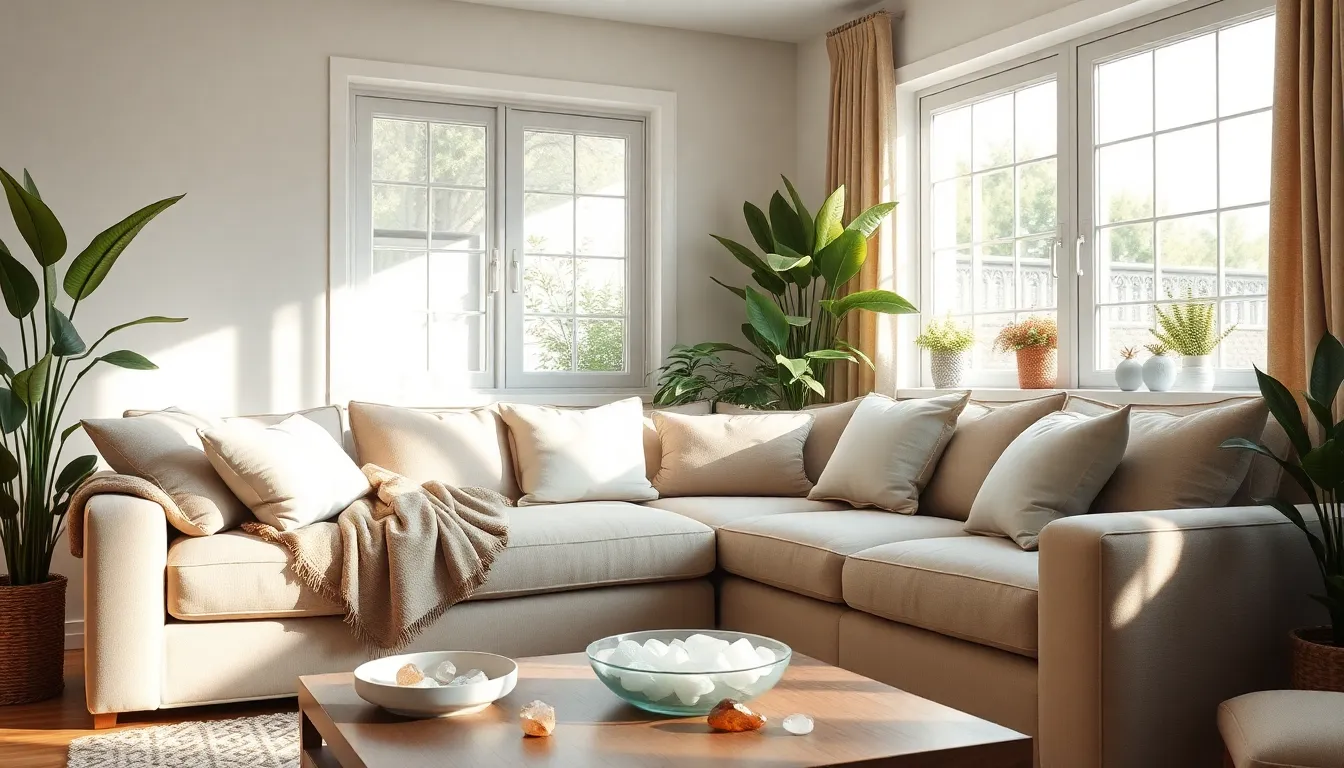Imagine waking up to the gentle hum of your coffee maker brewing your favorite blend while your smart thermostat adjusts the temperature to your perfect morning vibe. Sounds like a scene from a sci-fi movie, right? Welcome to the world of smart homes, where technology meets convenience and everyday tasks become a breeze.
From voice-activated assistants that obey your every command to security systems that keep your home safe while you binge-watch your favorite series, smart home devices are changing the game. With the right gadgets, homeowners can enjoy not just comfort but also energy savings and enhanced security. So why not dive into the pros of going smart? After all, who wouldn’t want a home that practically runs itself?
Table of Contents
ToggleOverview of Smart Home Pros
Smart homes offer numerous advantages that enhance daily living experiences. Convenience ranks high among these benefits, as voice-activated devices allow for seamless interactions. Security systems not only safeguard homes but also provide peace of mind through remote monitoring and alerts.
Energy efficiency stands as another significant pro. Smart thermostats optimize heating and cooling schedules, reducing energy consumption by up to 15%. Similarly, smart lighting systems can automatically adjust based on occupancy, further lowering energy costs.
Integration capabilities create a cohesive environment. Different devices communicate with one another, allowing for customized home automation. For example, homeowners can program routines where lights dim and music plays when a movie starts, all initiated by a single voice command.
In addition, smart homes enhance accessibility. Individuals with mobility challenges benefit from smart devices that can be controlled remotely. This technology allows them to manage various household tasks without physically needing to move around the house.
Another notable advantage links to improved home management. Users track energy usage and monitor home security through mobile applications in real time. This instant access empowers homeowners to make proactive decisions regarding their energy consumption and home safety.
Affordability of certain smart devices continues to improve, making them more accessible. As prices decrease, more homeowners invest in technology that elevates both comfort and security. Overall, the multiple advantages presented by smart homes illustrate their growing importance in modern living environments.
Enhanced Convenience

Smart homes enhance everyday convenience with advanced technology, simplifying daily tasks and offering seamless control.
Remote Access and Control
Remote access provides homeowners the ability to monitor and control devices from anywhere. Mobile applications enable users to adjust lighting, temperature, and security systems through their smartphones. This feature promotes peace of mind, as one can receive real-time alerts for unusual activities. Many systems support voice activation, allowing effortless commands for hands-free interactions. Remote control also streamlines routine adjustments without physically being present, making it ideal for those with busy lifestyles.
Automation and Scheduling
Automation elevates convenience by allowing devices to perform tasks automatically. Smart thermostats learn preferences and adjust temperatures accordingly, ensuring optimal comfort. Scheduling functionality enables homeowners to set specific times for devices to activate, effectively reducing energy consumption. Lights can turn on or off according to preset routines, providing security and energy savings. This adaptability means daily activities require less effort, allowing for a smoother, more efficient living experience.
Improved Energy Efficiency
Smart home technology significantly enhances energy efficiency in households. Homeowners benefit from smarter management of energy consumption, leading to lower utility bills.
Smart Thermostats
Smart thermostats track and adapt to user habits. These devices adjust heating and cooling systems automatically, reflecting preferences and daily routines. By learning patterns, they can minimize energy usage when nobody is home, resulting in savings of up to 15%. Furthermore, integration with other smart devices allows them to operate efficiently in tandem. Homeowners often appreciate the convenience of controlling these thermostats remotely through mobile applications, making it easier to adjust settings on-the-go.
Energy Monitoring Systems
Energy monitoring systems provide real-time insights into household energy consumption. Users can identify which devices are consuming the most energy and make informed decisions about usage. By setting alerts for excessive energy use, these systems empower homeowners to take action. Additionally, some energy monitoring tools offer recommendations for reducing consumption, contributing to greater overall efficiency. Many homeowners find that tracking their energy use leads to a more sustainable lifestyle, ensuring they prioritize energy-saving habits.
Increased Security
Smart home technology significantly enhances home security, providing homeowners with advanced tools to protect their property. The combination of smart locks and surveillance cameras allows for efficient monitoring and control.
Smart Locks and Cameras
Smart locks offer keyless entry, enabling homeowners to grant access remotely. They can receive notifications when someone attempts to enter, adding an extra layer of protection. Surveillance cameras, positioned indoors and outdoors, provide real-time video feeds accessible via mobile devices. These cameras often include features such as motion detection and night vision. Recorded footage can be saved in the cloud for later review, ensuring that homeowners have a record of any suspicious activity.
Intrusion Detection Systems
Intrusion detection systems utilize various sensors to detect unauthorized access. Motion sensors can trigger alarms, alerting homeowners and authorities immediately. Some systems enable integration with smart devices, allowing real-time alerts through mobile applications. Many setups include door and window sensors that notify homeowners if an entry point is breached. Surveillance cameras can work in conjunction with these systems, enhancing overall security monitoring. This comprehensive approach to protection fosters a safer living environment.
Home Comfort and Personalization
Smart home technology enhances comfort and customization, allowing homeowners to tailor their environments. This personalization creates a living space that reflects individual preferences and lifestyles.
Climate Control
Smart thermostats deliver precise climate control, adapting to user habits and preferences. They can reduce energy consumption by up to 15%, making homes more efficient. Users can set schedules for heating and cooling, ensuring optimal temperatures throughout the day. Real-time adjustments occur based on local weather forecasts and occupancy sensors, so energy is not wasted while homes are empty. Integration with voice-activated assistants allows for easy control, enabling quick changes through simple commands.
Lighting Customization
Smart lighting systems provide extensive customization options, allowing for the creation of various moods and settings. Homeowners can adjust brightness levels tailored to specific activities, such as reading or entertaining. Systems can also change colors, offering a significant advantage for ambiance. Automated lighting schedules sync with daily routines, turning lights on and off at designated times. Moreover, occupancy sensors enhance energy efficiency by ensuring lights operate only when needed, further contributing to energy savings.
Potential Drawbacks to Consider
Security vulnerabilities present a significant concern for smart home technology. Many devices connect to the internet, making them susceptible to hacking. Compromised devices could lead to unauthorized access, threatening personal privacy and safety.
Cost can also be a barrier. Many smart home devices come with a hefty price tag, particularly those with advanced features. Investing in a full suite of smart devices might strain budgets, especially for homeowners who prioritize affordability.
Interoperability challenges often arise as various brands and products may not integrate seamlessly. Homeowners might encounter difficulties in creating a cohesive smart environment if devices lack compatibility. Frustration can develop over switching between protocols or apps, leading to a less efficient experience.
Dependence on stable internet connections poses another drawback. Smart systems typically rely on internet access for functionality. Disruptions in service might render devices inoperable, affecting peace of mind when homeowners need to control their environment remotely.
User experience can be hindered by complexity. Many smart home systems feature intricate settings and numerous features that can confuse users. A steep learning curve may deter some homeowners from fully utilizing their devices.
Maintenance requirements must also be considered. Regular updates and troubleshooting may be necessary to ensure optimal performance. Homeowners might find themselves dedicating time and effort to keep systems running smoothly, which can be burdensome.
Privacy concerns frequently arise in conversations about smart homes. Devices often collect data to enhance user experiences, but this can raise alarms about how that data is used. Adequately reviewing privacy policies ensures homeowners understand the implications of their device usage.
Embracing smart home technology offers numerous advantages that enhance daily living. Homeowners can enjoy unparalleled convenience with voice-activated devices and automated systems that streamline everyday tasks. Energy efficiency becomes a reality as smart devices help manage consumption, leading to lower utility bills and a more sustainable lifestyle.
Security is significantly bolstered through advanced monitoring and control systems that provide peace of mind. Personalization options allow individuals to create environments tailored to their preferences, enhancing comfort and overall satisfaction. Despite some challenges, the benefits of smart homes make them an attractive choice for those looking to modernize their living spaces and improve their quality of life.



